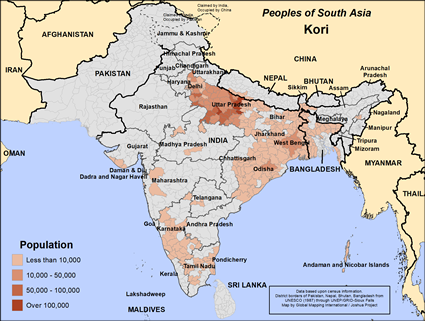The Kori are a Scheduled Caste of India living in the states of Uttar Pradesh, Maharashtra, Madhya Pradesh and Odisha. Their name comes from the Hindi word Kora meaning coarse cloth and it refers to their local traditional work of weaving that type of cloth.
In Uttar Pradesh the Kori speak Hindi. In Maharashtra they speak Marathi as well as a Hindi dialect. In Madhya Pradesh they speak Hindi, Malwi and Nimadi. They read and write in Devanagari. They speak Oriya in Odisha and read and write in Oriya. The Kori have a low social standing and are not well off financially. They are often mocked because they are weavers. The Kori of today are weavers except in Maharashtra where they are laborers, fruit sellers or in agriculture. Some Kori families use power looms. Some with land are farmers but many are landless and work as laborers.
As Hindus, they do not eat beef but they do eat chicken, mutton, pork and eggs. In Maharashtra they do not eat pork. They eat wheat, rice, dairy produce, fruits in season and vegetables. They are allowed alcohol. They have low literacy levels, so the gospel would need to be given in oral form. They use modern and traditional medicines and like family planning except in Odisha. Most of the Kori do not use banks but use moneylenders and shopkeepers.
The Kori are endogamous, which means they do not normally marry outside their group. They believe in monogamy and adult marriages that are arranged by the elders of both families. Cross cousin marriages are allowed except in Madhya Pradesh. A dowry is given except in Maharashtra. Divorce is allowed if approved socially. Divorcees and the bereaved can remarry. Sons inherit the property of the father and the oldest son becomes in charge of the home. Women do the housework and help with weaving and agriculture. The Kori have caste councils who judge things like adultery and divorce. Fines are the usual punishment with excommunication being the last resort.
The Kori are Hindus and worship all the Hindu gods and goddesses and they have community gods too. They take part in the major Hindu festivals. Brahmin priests do birth, marriage and death rituals. They mostly cremate the dead but bury them in cases such as leprosy or suicides. Very young children are buried. Ashes are immersed in a river, the Ganges being favored. They have birth and death pollution set periods.
It is said that if the Kori make good use of government assistance they would not be so poor. If their children were educated they would have a better future.
Pray that the Kori realize Jesus Christ will accept them as they are as weavers and that they will give their lives to him. Pray for Kori people to disciple others in the ways of Jesus.
Scripture Prayers for the Kori in India.
www.peoplegroupsindia.com/profiles/kori
| Profile Source: Joshua Project |












